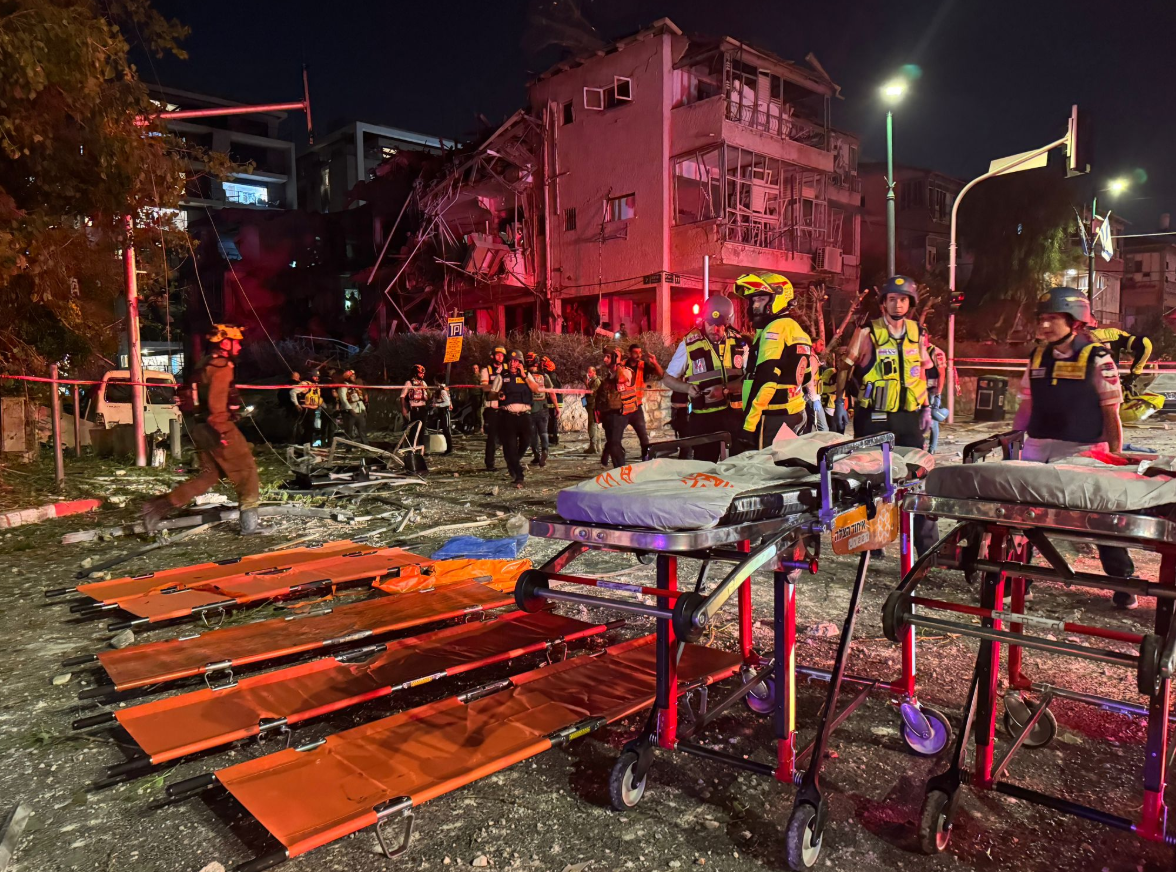Iran launched missiles at Israel after Israeli strikes on Iranian sites, killing dozens and escalating regional tensions.

TEL AVIV, Israel (WE) — Iran fired missiles at Israel on Saturday, including direct strikes on Haifa, after Israeli forces bombed Iranian civilian and energy infrastructure. The Islamic Revolutionary Guard Corps (IRGC) claimed responsibility for the missile attack. They said their targets included Israeli energy sites. Israeli emergency services confirmed at least three deaths in the north and dozens of injuries in other areas.
Iranian state media reported that Israeli strikes killed 80 people and injured more than 800 in the last 48 hours. The Shahran oil facility in Tehran remains on fire, with crews still battling the blaze. Iranian officials blamed Israel for the destruction. Israel has not responded to that claim.
In Tel Aviv, a missile hit a residential area. A 60-year-old woman died, and 20 others sustained moderate or minor injuries. A separate strike near Jerusalem injured 24 people, including two who remain in critical condition. Emergency teams from Magen David Adom continue rescue operations at several damaged sites.
Earlier reports from The Times of Israel indicated five deaths in the north during Iran’s first round of missile strikes. Cities like Haifa and Akko suffered heavy damage. Defense systems intercepted many projectiles but failed to stop all of them.
Iran responded with a major political move as well. Its officials canceled the sixth round of nuclear talks with the United States, citing what they called unjustified Israeli aggression. Foreign Minister Abbas Araghchi said there was “no justification for continuing negotiations.”
Iran also announced it would halt cooperation with the International Atomic Energy Agency (IAEA). Deputy Foreign Minister Kazem Gharibabadi criticized the agency for staying silent about Israeli attacks on Iran’s nuclear facilities. “These peaceful sites are under attack, and the agency says nothing,” he said. He added that Iran would no longer share information about how it intends to protect its nuclear materials and equipment.
The White House reacted with concern. President Donald Trump posted on Truth Social that he had spoken with Russian President Vladimir Putin. Trump said they discussed the Iran-Israel conflict and agreed that it must stop. He called the situation “alarming.” Putin reportedly offered to help mediate, though Trump used the moment to urge Russia to also end its war in Ukraine.
Despite these talks, there’s no movement toward new negotiations. Steve Witkoff, the U.S. envoy to the Middle East, remains ready to meet, but no sessions are scheduled. As Sunday began in many parts of the world, indirect U.S.–Iran discussions still hadn’t resumed.
Meanwhile, Iran’s regional position appears weakened. Since Israel’s war on Gaza began in October 2023, Iran has lost key allies and strategic footholds. Israel assassinated Hezbollah leader Hassan Nasrallah in Beirut. Israeli airstrikes hit Houthi targets in Yemen and Iraqi militias aligned with Tehran. In Syria, the ouster of Bashar al-Assad last year removed one of Iran’s oldest regional allies.
Given those losses, Iran’s latest missile strikes raise questions. Is Tehran launching these attacks from a place of strength—or desperation?
Read More:
- Israeli Strikes Hit Iran’s Nuclear and Military Targets, Revolutionary Guard Chief Reported Killed
- One Survivor Reported as Air India Plane Crash in Ahmedabad Kills 240
- US Moves to Evacuate Embassy Staff Amid Rising Middle East Tensions, Signals Hard Line Against Iran’s Nuclear Ambitions
The war has also exposed inequalities inside Israel. Palestinian citizens living in Israel have far less access to shelters than their Jewish neighbors. A 2024 report from the Israel Democracy Institute (IDI) showed that over half of Arab residents living within 9 kilometers of Israel’s borders have no protective structures. Among Jewish residents in those areas, nearly all have shelter access.
The report also cited data from the State Comptroller. It found that 60% of Palestinian citizens believe the Israeli government doesn’t offer them the same protection. Arab communities near borders and security walls remain especially exposed.
While Israel and Iran continue trading attacks, global energy markets grow more anxious. Sina Toossi, a senior fellow at the Center for International Policy, warned that Iran could escalate further by shutting down the Strait of Hormuz. According to Toossi, this would be Iran’s most extreme response to Israeli strikes on its oil and gas infrastructure.
The IRINN news agency reported that Iranian leaders are seriously considering closing the Strait. The narrow waterway is the Persian Gulf’s only entry point for shipping. About 20% of the world’s oil flows through it, according to the U.S. Energy Information Administration.
“We’re not at that point yet,” Toossi said. “But today, Israel bombed a gas field in southern Iran. And Iran struck energy sites in Haifa.” If both sides continue targeting oil and gas facilities, the region could plunge into a full energy war. That could drive oil prices sky-high and disrupt global shipping.
The conflict has evolved into more than a military battle. It now includes cyberattacks, drone strikes, and attacks on infrastructure. Both countries seem determined to cripple the other’s economy and energy sectors. Civilian populations on both sides are increasingly at risk.
Neither Iran nor Israel shows signs of pulling back. Tehran frames its actions as justified retaliation. Israel says it’s acting in defense. With diplomacy collapsing and military attacks expanding, the region teeters on the edge of a broader war.
The United Nations Security Council has scheduled an emergency session. However, few expect a real breakthrough. Without diplomatic momentum, the next steps by Tehran or Jerusalem could spark a regional crisis that draws in neighboring countries—and major world powers.